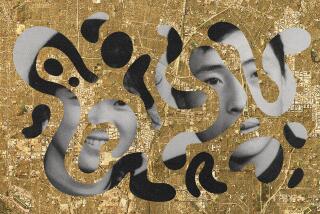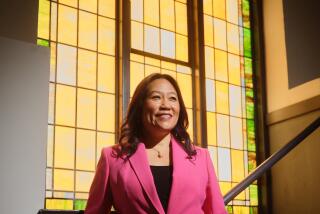MOVIE REVIEW : Documenting Asian-American Experience
Arthur Dong’s “Claiming a Voice” is a stirring, illuminating one-hour documentary celebrating the 20th anniversary of Visual Communications, the country’s oldest Asian Pacific media-arts organization, headquartered in a downtown loft. It will screen Saturday at 8 p.m. at the Japan America Theater in Little Tokyo as part of V.C.’s anniversary program.
Dong, the gifted maker of such films as “Sewing Woman,” “Lotus” and “Forbidden City, U.S.A.,” combines interviews with such V.C. founders as Duane Kubo, Bob Nakamura and Eddie Wong with clips from their films and those of many others to trace the evolution of the organization from a pioneering producing unit to a wide-ranging support group.
V.C.’s founders, most of whom were film students in the activist ‘60s, discovered that they shared a desire to create images that would counteract the Asian stereotypes perpetuated in the media over decades. They and their many colleagues, such as Dan Kuramoto, leader of the jazz fusion band Hiroshima, speak of their personal need to discover their identities as hyphenate Americans. (Hiroshima will perform Saturday as part of the V.C. festivities.)
They began modestly with educational tools such as game boards for elementary school children designed to make them aware and proud of their cultural heritage. Soon V.C. was producing films and videos of every form--documentary, fiction, animation. Dong has extracted apt clips from such landmark V.C. productions as its ambitious feature-length drama “Hito Hata,” in which the entire Japanese-American experience is expressed through the long life of an elderly immigrant, played beautifully by Mako, and featuring Noriyuki (Pat) Morita and the late Yuki Shimoda. (Shimoda was to become the subject of one of V.C.’s best documentaries, a touching study of an actor who managed to keep growing in his craft despite the limited opportunities that exist for Asian Pacific-American performers.) There are clips from films dealing with the Samoan community and from Supachai Surongsain’s “Pak Bueng on Fire,” a brief but eloquent story of two young Thai men’s struggle to survive in Los Angeles.
The interviewees speak of around-the-clock editing shifts necessitated by limited equipment and the struggle simply to survive as an organization, not only in the early years but more recently during the arts-funding cutbacks of the Reagan Administration. V.C.’s founders and early members have by and large moved into mainstream media to make way for a new generation, but the fight against racism continues, reminds V.C.’s current executive director, Linda Mabalot. The words of Yuki Shimoda, nearing the end of his life, could stand as a credo for “Claiming a Voice”--and V.C.: “If we don’t fight for something we believe in, we’re just wasting time.”
For anniversary program information: (213) 680-4462.
More to Read
Only good movies
Get the Indie Focus newsletter, Mark Olsen's weekly guide to the world of cinema.
You may occasionally receive promotional content from the Los Angeles Times.










